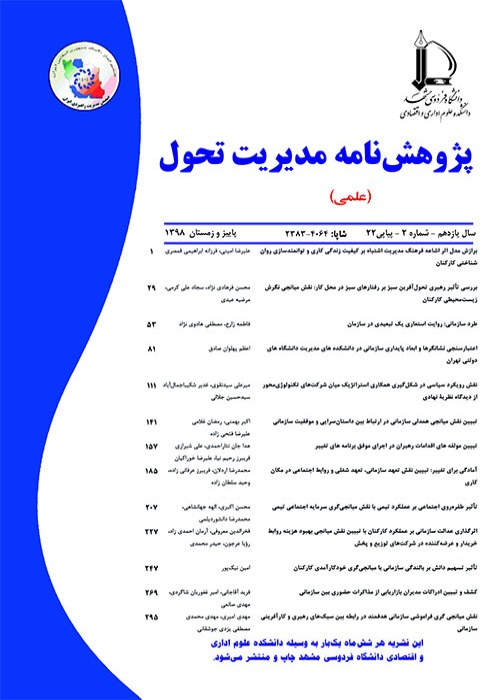Investigation the mediatiing role of affective commitment and moderating role of supervisor support in the relationship between job insecurity and counterproductive behaviors
Author(s):
Abstract:
INTRODUCTION
In terms of psychology, job dissatisfaction and insecurity may have an impact on counterproductive behavior because they create conflicts between the employee and the employer and have negative impacts on employee well-being and efficiency. Individuals who are dissatisfied with their job, their commitment to work will decreases and consequently their destructive behaviors will increase. Affective commitment suggest that the employees of the organization have a strong desire for membership and a very low willingness to leave and is more likely to be the indicator of job satisfaction. The existence of job insecurity creates counterproductive behaviors in the organization, which leads to the elimination of employee commitment and the emergence of problems in the organization; therefore, it seems necessary to examine the relationship between these factors. In general, the purpose of this study was to investigate the effect of job insecurity on counterproductive behaviors with the mediating role of Affective commitment and the moderatoring role of supervisor support. The researchers seek to answer the question that does job insecurity lead to counterproductive behaviors in organizations?
THEORETICAL FRAMEWORK
The counterproductive behavior can continue in a range of less severe offenses (such as five minutes late or leave five minutes early, surfing the Internet) to more serious offenses (such as verbal harassment, or physical harm to employees). Despite the fact that most of the reports of economic losses related to these behaviors in workplace are committed by employees in the United States and in other countries, there is some evidence that indicates these behaviors are not limited to a specific geographical range and they have a global outbreak. According to industrial and organizational psychologists, job security is one of the factors that creates job satisfaction. The sense of job security can be defined as an individual's assessment of the individual, organizational and environmental conditions that leads him to a conclusion that his particular occupational safety factor doesn,t threat him and that he can be sure of his employment at the present time and in the future. If a person feels job insecurity in the organization, he may engage in Counterproductive behaviors that have implications to the organization. The main sources of support in the organization for employees are the percieved organizational , supervisor and Colleague support. The hypotheses of this research are: Hypothesis 1: Job insecurity affects counterproductive behaviors. Hypothesis 2: Job insecurity affects affective commitment. Hypothesis 3: affective commitment affects Counterproductive behaviors. Hypothesis 4: affective commitment mediates the impact of job insecurity on counterproductive behaviors. Hypothesis 5: Supervisors' support moderates the impact of job insecurity on affective commitment. Hypothesis 6: Supervisors' support moderates the effect of affective commitment on counterproductive behaviors.
METHODOLOGY
Based on the purpose, this study is an applied research and in terms of nature is a descriptive-survey research. Structured questionnaires has been used to collect data. Because this study investigates the relationship between variables, thus it uses structural equations model and the second version of Smart PlS software.
RESULTS & DISCUSSION
Considering the significance coefficient for paths between variables, all the research hypotheses have been confirmed. Confirming the mediating role of affective commitment, job insecurity has a indirect and significant effect on the counterproductive behaviors. The amount of Z-value obtained from the Soubel test is 6.865 which because it is greater than 1.96, therefore it can be suggested that the effect of the mediating role of affective commitment on the relationship between job insecurity and counterproductive behaviors is significant at the 95% of confidence level. The achievement of the 0.381 for VAF in this study means that more than one-third of the job insecurity effect on counterproductive behaviors is explained by the mediating role of affective commitment.
CONCLUSIONS & SUGGESTIONS
Based on the results obtained from the hypothesis test and given that job insecurity has a direct impact on increasing the intention to perform counterproductive behaviors by employees, it is suggested that the company adopt strategies and activities to increase the employees' job security and reduce their concern for loss their job. It is suggested that the studied company should pay attention to the empowerment of its employees in order to achieve a higher organizational performance; Regarding the effect of affective commitment on employees' counterproductive behaviors, it is suggested that the company consider the necessary arrangements to create a sense of satisfaction among employees, so that the organization and the position of the employees of staff will give them a sense of pride. It is suggested that supervisors carry out the necessary activities to increase work motivation, accountability, as well as regulating employees in the organization. On the other hand, it is recommended that the company take steps to create a friendly and ethical atmosphere. The results of the hypotheses indicate that supervisors through appropriate feedback and attention to employees have a moderating effect on their affective commitment; therefore, they will reduce the intention to perform counterproductive behaviors by employees.Language:
Persian
Published:
Transformation Managemet Journal, Volume:10 Issue: 2, 2019
Pages:
123 to 148
magiran.com/p1973086
دانلود و مطالعه متن این مقاله با یکی از روشهای زیر امکان پذیر است:
اشتراک شخصی
با عضویت و پرداخت آنلاین حق اشتراک یکساله به مبلغ 1,390,000ريال میتوانید 70 عنوان مطلب دانلود کنید!
اشتراک سازمانی
به کتابخانه دانشگاه یا محل کار خود پیشنهاد کنید تا اشتراک سازمانی این پایگاه را برای دسترسی نامحدود همه کاربران به متن مطالب تهیه نمایند!
توجه!
- حق عضویت دریافتی صرف حمایت از نشریات عضو و نگهداری، تکمیل و توسعه مگیران میشود.
- پرداخت حق اشتراک و دانلود مقالات اجازه بازنشر آن در سایر رسانههای چاپی و دیجیتال را به کاربر نمیدهد.
In order to view content subscription is required
Personal subscription
Subscribe magiran.com for 70 € euros via PayPal and download 70 articles during a year.
Organization subscription
Please contact us to subscribe your university or library for unlimited access!




